艾森豪威尔演讲
摆脱恐惧演讲稿(精选5篇)

摆脱恐惧演讲稿(精选5篇)摆脱恐惧演讲稿 1恐惧感,是人与生具有的一种本能,它能很好的保护人类,使人能够远离危险的环境或事物。
但并不是所有的恐惧感都是对人类有益的,比如当着众人的面说话或者进行演讲的这种恐惧感对现代人类不但没有好处,而且成为了制约人发展的一个绊脚石。
今天我想就怎么克服当众演讲的这种恐惧感用我的一点经验与大家探讨一下。
首先我们应该明白,所有的演讲者都会恐惧和紧张。
美国的科学家做了一个试验,对上万名受访者做了问卷调查,问卷上列出了七种最让人感到恐惧和紧张的事情,让科学家大跌眼镜的是,当众演讲排在了第一位,(提问一下大家排在第二位的是什么呢?)排在第二位的是死亡。
可见当众演讲是比对死亡的恐惧更让人感到紧张的事情。
就连美国最出名的演讲者林肯总统的第一次当众演讲也是因为紧张而以失败告终的。
所以演讲者一定要明白,不是只有你才会紧张,所有的演讲者都会有紧张情绪。
他演讲的比较好并不能代表他比你强多少,只是他已经很好的克服了当众演讲的恐惧感而已,你了解了这一点才能让自己自信起来,自信是克服紧张的最基础的素质!第二点、充分的准备充分的准备是克服恐惧感的前题,包括前一点所讲到的自信也是建立在充分准备的基础之上的。
你如果准备了相当于晨会主题三倍的内容,在演讲时你就算因为紧张而忘掉了一部分,那么剩下的内容也足以让你的晨会内容仍然是丰富的,不会出现没话说,台上台下都很尴尬的一种局面。
第三点、用提纲记住关键词关键词是你这个段落意思的核心。
有时因为紧张,一下想不起自己下面要说些什么了,这时你就看一眼自己提纲上的关键词。
看到了它,你所希望表达的意思就能够很快的想起来。
段落之间的关键词起着承接你下一段的表述,会让你的演讲更平顺,不会显得突兀。
所以这种词要用黑笔勾出来,在你需要它们的时候,以使你第一眼就能找到它们,不会让你的演讲出现不必要的中段。
第四点、尽量制造一些你与台下人的互动互动会让听众显的更加的热情,听众的热情会让演讲的人感受到这是一次愉快的活动,从而放下心理的负担、消除紧张,变得轻松起来。
艾森豪威尔离职演讲
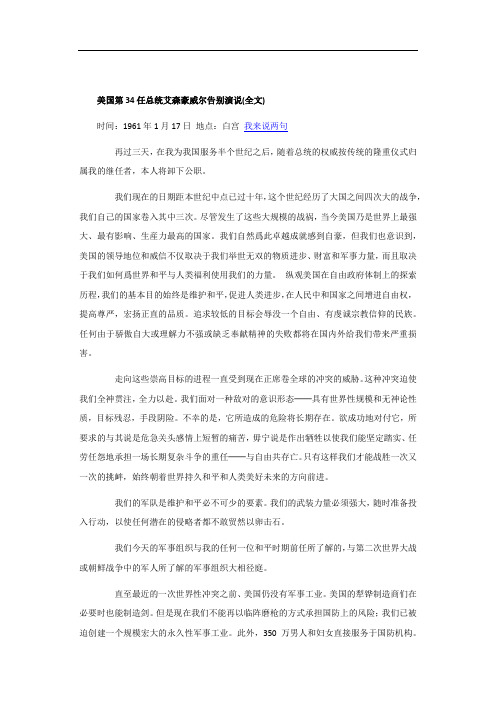
美国第34任总统艾森豪威尔告别演说(全文)时间:1961年1月17日地点:白宫我来说两句再过三天,在我为我国服务半个世纪之后,随着总统的权威按传统的隆重仪式归属我的继任者,本人将卸下公职。
我们现在的日期距本世纪中点已过十年,这个世纪经历了大国之间四次大的战争,我们自己的国家卷入其中三次。
尽管发生了这些大规模的战祸,当今美国乃是世界上最强大、最有影响、生産力最高的国家。
我们自然爲此卓越成就感到自豪,但我们也意识到,美国的领导地位和威信不仅取决于我们举世无双的物质进步、财富和军事力量,而且取决于我们如何爲世界和平与人类福利使用我们的力量。
纵观美国在自由政府体制上的探索历程,我们的基本目的始终是维护和平,促进人类进步,在人民中和国家之间增进自由权,提高尊严,宏扬正直的品质。
追求较低的目标会辱没一个自由、有虔诚宗教信仰的民族。
任何由于骄傲自大或理解力不强或缺乏奉献精神的失败都将在国内外给我们带来严重损害。
走向这些崇高目标的进程一直受到现在正席卷全球的冲突的威胁。
这种冲突迫使我们全神贯注,全力以赴。
我们面对一种敌对的意识形态──具有世界性规模和无神论性质,目标残忍,手段阴险。
不幸的是,它所造成的危险将长期存在。
欲成功地对付它,所要求的与其说是危急关头感情上短暂的痛苦,毋宁说是作出牺牲以使我们能坚定踏实、任劳任怨地承担一场长期复杂斗争的重任──与自由共存亡。
只有这样我们才能战胜一次又一次的挑衅,始终朝着世界持久和平和人类美好未来的方向前进。
我们的军队是维护和平必不可少的要素。
我们的武装力量必须强大,随时准备投入行动,以使任何潜在的侵略者都不敢贸然以卵击石。
我们今天的军事组织与我的任何一位和平时期前任所了解的,与第二次世界大战或朝鲜战争中的军人所了解的军事组织大相径庭。
直至最近的一次世界性冲突之前、美国仍没有军事工业。
美国的犁铧制造商们在必要时也能制造剑。
但是现在我们不能再以临阵磨枪的方式承担国防上的风险;我们已被迫创建一个规模宏大的永久性军事工业。
艾森豪威尔离职演讲
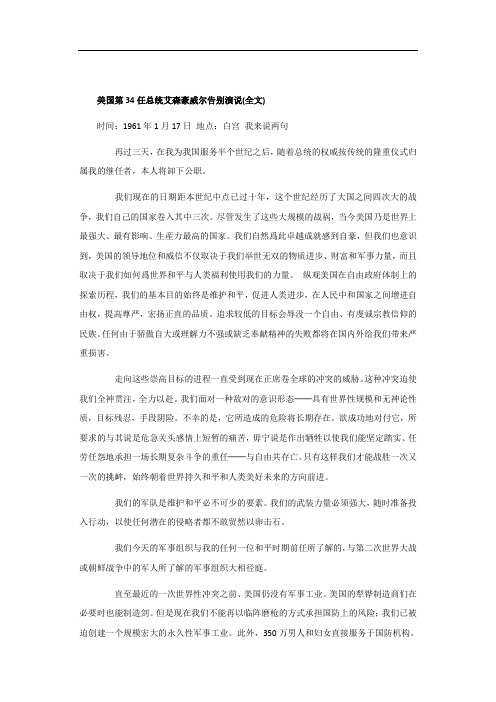
美国第34任总统艾森豪威尔告别演说(全文)时间:1961年1月17日地点:白宫我来说两句再过三天,在我为我国服务半个世纪之后,随着总统的权威按传统的隆重仪式归属我的继任者,本人将卸下公职。
我们现在的日期距本世纪中点已过十年,这个世纪经历了大国之间四次大的战争,我们自己的国家卷入其中三次。
尽管发生了这些大规模的战祸,当今美国乃是世界上最强大、最有影响、生産力最高的国家。
我们自然爲此卓越成就感到自豪,但我们也意识到,美国的领导地位和威信不仅取决于我们举世无双的物质进步、财富和军事力量,而且取决于我们如何爲世界和平与人类福利使用我们的力量。
纵观美国在自由政府体制上的探索历程,我们的基本目的始终是维护和平,促进人类进步,在人民中和国家之间增进自由权,提高尊严,宏扬正直的品质。
追求较低的目标会辱没一个自由、有虔诚宗教信仰的民族。
任何由于骄傲自大或理解力不强或缺乏奉献精神的失败都将在国内外给我们带来严重损害。
走向这些崇高目标的进程一直受到现在正席卷全球的冲突的威胁。
这种冲突迫使我们全神贯注,全力以赴。
我们面对一种敌对的意识形态──具有世界性规模和无神论性质,目标残忍,手段阴险。
不幸的是,它所造成的危险将长期存在。
欲成功地对付它,所要求的与其说是危急关头感情上短暂的痛苦,毋宁说是作出牺牲以使我们能坚定踏实、任劳任怨地承担一场长期复杂斗争的重任──与自由共存亡。
只有这样我们才能战胜一次又一次的挑衅,始终朝着世界持久和平和人类美好未来的方向前进。
我们的军队是维护和平必不可少的要素。
我们的武装力量必须强大,随时准备投入行动,以使任何潜在的侵略者都不敢贸然以卵击石。
我们今天的军事组织与我的任何一位和平时期前任所了解的,与第二次世界大战或朝鲜战争中的军人所了解的军事组织大相径庭。
直至最近的一次世界性冲突之前、美国仍没有军事工业。
美国的犁铧制造商们在必要时也能制造剑。
但是现在我们不能再以临阵磨枪的方式承担国防上的风险;我们已被迫创建一个规模宏大的永久性军事工业。
艾森豪威尔名词解释

艾森豪威尔名词解释
艾森豪威尔(Eisenhower)是第34任美国总统(1953-1961),也是
美国历史上最伟大的政治家之一。
他曾参加第二次世界大战,担任联合国
司令部司令,并获得了五枚军功勋章和十枚表彰勋章。
在他任职期间,他
推行了“新经济”的概念,将联邦预算关系调整为与联邦财政相一致,并
将教育投入调整为更高水平,推行了新的社会福利政策,并建立了新的环
境规范,推动了经济政策,普及最新技术等等。
他采取了反核军控政策,
并领导美国走向消除冷战局面。
艾森豪威尔曾发表了“提交经济未来主义”的演讲,强调了经济和社会发展的重要性,特别是在支付联邦政府所需的
投资方面,他强调了可持续的经济成长的必要性。
艾森豪威尔鼓励美国人
民投资未来,同时鼓励国家平衡联邦预算,以帮助维持一个稳定的经济环境。
他被认为是一位伟大的现实主义者,他的领导能力和谋略使他的治理
受到了全球的尊敬和称赞。
艾森豪威尔和平的捍卫者
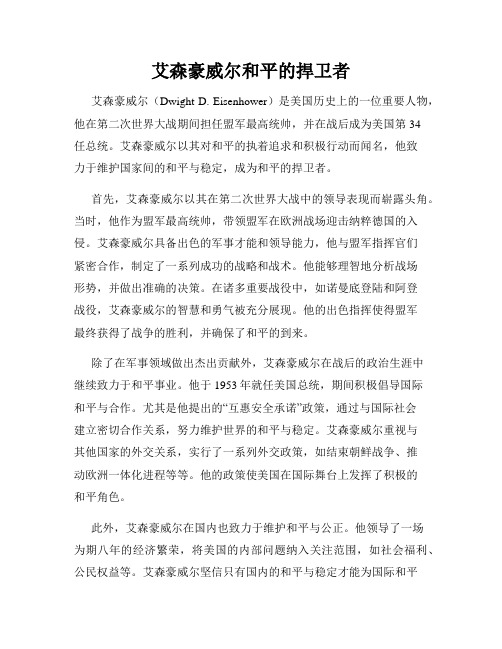
艾森豪威尔和平的捍卫者艾森豪威尔(Dwight D. Eisenhower)是美国历史上的一位重要人物,他在第二次世界大战期间担任盟军最高统帅,并在战后成为美国第34任总统。
艾森豪威尔以其对和平的执着追求和积极行动而闻名,他致力于维护国家间的和平与稳定,成为和平的捍卫者。
首先,艾森豪威尔以其在第二次世界大战中的领导表现而崭露头角。
当时,他作为盟军最高统帅,带领盟军在欧洲战场迎击纳粹德国的入侵。
艾森豪威尔具备出色的军事才能和领导能力,他与盟军指挥官们紧密合作,制定了一系列成功的战略和战术。
他能够理智地分析战场形势,并做出准确的决策。
在诸多重要战役中,如诺曼底登陆和阿登战役,艾森豪威尔的智慧和勇气被充分展现。
他的出色指挥使得盟军最终获得了战争的胜利,并确保了和平的到来。
除了在军事领域做出杰出贡献外,艾森豪威尔在战后的政治生涯中继续致力于和平事业。
他于1953年就任美国总统,期间积极倡导国际和平与合作。
尤其是他提出的“互惠安全承诺”政策,通过与国际社会建立密切合作关系,努力维护世界的和平与稳定。
艾森豪威尔重视与其他国家的外交关系,实行了一系列外交政策,如结束朝鲜战争、推动欧洲一体化进程等等。
他的政策使美国在国际舞台上发挥了积极的和平角色。
此外,艾森豪威尔在国内也致力于维护和平与公正。
他领导了一场为期八年的经济繁荣,将美国的内部问题纳入关注范围,如社会福利、公民权益等。
艾森豪威尔坚信只有国内的和平与稳定才能为国际和平做出贡献,他通过制定一系列内政政策来增强国家内部的凝聚力与稳定性。
总之,艾森豪威尔是一位在世界历史舞台上具有重要影响力的人物。
通过他在第二次世界大战中的杰出战略指挥,以及在战后的政治生涯中的积极推动和平事业,他成为了和平的捍卫者。
艾森豪威尔的努力为世界带来了长期稳定的局势,并使得各国关系更加和睦。
他为后世留下了宝贵的和平经验和启示,在我们追求和平与稳定的道路上树立了榜样。
艾森豪威尔告别演说原文
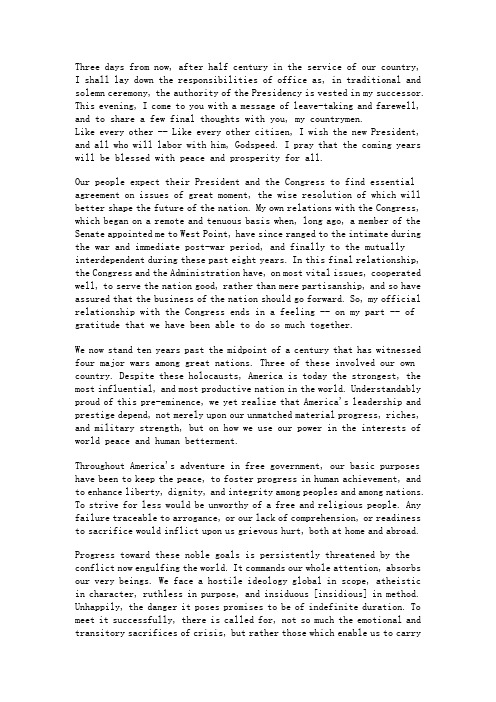
Three days from now, after half century in the service of our country, I shall lay down the responsibilities of office as, in traditional and solemn ceremony, the authority of the Presidency is vested in my successor. This evening, I come to you with a message of leave-taking and farewell, and to share a few final thoughts with you, my countrymen.Like every other -- Like every other citizen, I wish the new President, and all who will labor with him, Godspeed. I pray that the coming years will be blessed with peace and prosperity for all.Our people expect their President and the Congress to find essential agreement on issues of great moment, the wise resolution of which will better shape the future of the nation. My own relations with the Congress, which began on a remote and tenuous basis when, long ago, a member of the Senate appointed me to West Point, have since ranged to the intimate during the war and immediate post-war period, and finally to the mutually interdependent during these past eight years. In this final relationship, the Congress and the Administration have, on most vital issues, cooperated well, to serve the nation good, rather than mere partisanship, and so have assured that the business of the nation should go forward. So, my official relationship with the Congress ends in a feeling -- on my part -- of gratitude that we have been able to do so much together.We now stand ten years past the midpoint of a century that has witnessed four major wars among great nations. Three of these involved our own country. Despite these holocausts, America is today the strongest, the most influential, and most productive nation in the world. Understandably proud of this pre-eminence, we yet realize that America's leadership and prestige depend, not merely upon our unmatched material progress, riches, and military strength, but on how we use our power in the interests of world peace and human betterment.Throughout America's adventure in free government, our basic purposes have been to keep the peace, to foster progress in human achievement, and to enhance liberty, dignity, and integrity among peoples and among nations. To strive for less would be unworthy of a free and religious people. Any failure traceable to arrogance, or our lack of comprehension, or readiness to sacrifice would inflict upon us grievous hurt, both at home and abroad.Progress toward these noble goals is persistently threatened by the conflict now engulfing the world. It commands our whole attention, absorbs our very beings. We face a hostile ideology global in scope, atheistic in character, ruthless in purpose, and insiduous [insidious] in method. Unhappily, the danger it poses promises to be of indefinite duration. To meet it successfully, there is called for, not so much the emotional and transitory sacrifices of crisis, but rather those which enable us to carryforward steadily, surely, and without complaint the burdens of a prolonged and complex struggle with liberty the stake. Only thus shall we remain, despite every provocation, on our charted course toward permanent peace and human betterment.Crises there will continue to be. In meeting them, whether foreign or domestic, great or small, there is a recurring temptation to feel that some spectacular and costly action could become the miraculous solution to all current difficulties. A huge increase in newer elements of our defenses; development of unrealistic programs to cure every ill in agriculture; a dramatic expansion in basic and applied research -- these and many other possibilities, each possibly promising in itself, may be suggested as the only way to the road we wish to travel.But each proposal must be weighed in the light of a broader consideration: the need to maintain balance in and among national programs, balance between the private and the public economy, balance between the cost and hoped for advantages, balance between the clearly necessary and the comfortably desirable, balance between our essential requirements as a nation and the duties imposed by the nation upon the individual, balance between actions of the moment and the national welfare of the future. Good judgment seeks balance and progress. Lack of it eventually finds imbalance and frustration. The record of many decades stands as proof that our people and their Government have, in the main, understood these truths and have responded to them well, in the face of threat and stress.But threats, new in kind or degree, constantly arise. Of these, I mention two only.A vital element in keeping the peace is our military establishment. Our arms must be mighty, ready for instant action, so that no potential aggressor may be tempted to risk his own destruction. Our military organization today bears little relation to that known of any of my predecessors in peacetime, or, indeed, by the fighting men of World War II or Korea.Until the latest of our world conflicts, the United States had no armaments industry. American makers of plowshares could, with time and as required, make swords as well. But we can no longer risk emergency improvisation of national defense. We have been compelled to create a permanent armaments industry of vast proportions. Added to this, three and a half million men and women are directly engaged in the defense establishment. We annually spend on military security alone more than the net income of all United States cooperations -- corporations.Now this conjunction of an immense military establishment and a large arms industry is new in the American experience. The total influence -- economic, political, even spiritual -- is felt in every city, every Statehouse, every office of the Federal government. We recognize the imperative need for this development. Yet, we must not fail to comprehend its grave implications. Our toil, resources, and livelihood are all involved. So is the very structure of our society.In the councils of government, we must guard against the acquisition of unwarranted influence, whether sought or unsought, by themilitary-industrial complex. The potential for the disastrous rise of misplaced power exists and will persist. We must never let the weight of this combination endanger our liberties or democratic processes. We should take nothing for granted. Only an alert and knowledgeable citizenry can compel the proper meshing of the huge industrial and military machinery of defense with our peaceful methods and goals, so that security and liberty may prosper together.Akin to, and largely responsible for the sweeping changes in our industrial-military posture, has been the technological revolution during recent decades. In this revolution, research has become central; it also becomes more formalized, complex, and costly. A steadily increasing share is conducted for, by, or at the direction of, the Federal government.Today, the solitary inventor, tinkering in his shop, has been overshadowed by task forces of scientists in laboratories and testing fields. In the same fashion, the free university, historically the fountainhead of free ideas and scientific discovery, has experienced a revolution in the conduct of research. Partly because of the huge costs involved, a government contract becomes virtually a substitute for intellectual curiosity. For every old blackboard there are now hundreds of new electronic computers. The prospect of domination of the nation's scholars by Federal employment, project allocations, and the power of money is ever present -- and is gravely to be regarded.Yet, in holding scientific research and discovery in respect, as we should, we must also be alert to the equal and opposite danger that public policy could itself become the captive of a scientific-technological elite.It is the task of statesmanship to mold, to balance, and to integrate these and other forces, new and old, within the principles of our democratic system -- ever aiming toward the supreme goals of our free society.Another factor in maintaining balance involves the element of time. As we peer into society's future, we -- you and I, and our government -- must avoid the impulse to live only for today, plundering for our own ease and convenience the precious resources of tomorrow. We cannot mortgage the material assets of our grandchildren without risking the loss also of their political and spiritual heritage. We want democracy to survive for all generations to come, not to become the insolvent phantom of tomorrow.During the long lane of the history yet to be written, America knows that this world of ours, ever growing smaller, must avoid becoming a community of dreadful fear and hate, and be, instead, a proud confederation of mutual trust and respect. Such a confederation must be one of equals. The weakest must come to the conference table with the same confidence as do we, protected as we are by our moral, economic, and military strength. That table, though scarred by many fast frustrations -- past frustrations, cannot be abandoned for the certain agony of disarmament -- of the battlefield.Disarmament, with mutual honor and confidence, is a continuing imperative. Together we must learn how to compose differences, not with arms, but with intellect and decent purpose. Because this need is so sharp and apparent,I confess that I lay down my official responsibilities in this field witha definite sense of disappointment. As one who has witnessed the horror and the lingering sadness of war, as one who knows that another war could utterly destroy this civilization which has been so slowly and painfully built over thousands of years, I wish I could say tonight that a lasting peace is in sight.Happily, I can say that war has been avoided. Steady progress toward our ultimate goal has been made. But so much remains to be done. As a private citizen, I shall never cease to do what little I can to help the world advance along that road.So, in this, my last good night to you as your President, I thank you for the many opportunities you have given me for public service in war and in peace. I trust in that -- in that -- in that service you find some things worthy. As for the rest of it, I know you will find ways to improve performance in the future.You and I, my fellow citizens, need to be strong in our faith that all nations, under God, will reach the goal of peace with justice. May we be ever unswerving in devotion to principle, confident but humble with power, diligent in pursuit of the Nations' great goals.To all the peoples of the world, I once more give expression to America's prayerful and continuing aspiration: We pray that peoples of all faiths, all races, all nations, may have their great human needs satisfied; that those now denied opportunity shall come to enjoy it to the full; that all who yearn for freedom may experience its few spiritual blessings. Those who have freedom will understand, also, its heavy responsibility; that all who are insensitive to the needs of others will learn charity; and that the sources -- scourges of poverty, disease, and ignorance will be made [to] disappear from the earth; and that in the goodness of time, all peoples will come to live together in a peace guaranteed by the binding force of mutual respect and love.Now, on Friday noon, I am to become a private citizen. I am proud to do so. I look forward to it.Thank you, and good night.。
关于担当演讲稿800字

关于担当演讲稿800字担当的果实已成熟,我们也在担当中逐渐地学习和成长,我们要感谢那一道屏障,带给了我们今生难忘的岁月,我们学会了担当并固执地扛起了担当。
一起来看看关于担当演讲稿800字,欢迎查阅!关于担当演讲稿1大家好,我今天演讲的题目是—红色青春,勇担使命看了电视剧《国家命运》,感慨万千。
剧中再现了上世纪__0年代至70年代初,我国科学家在经济、技术、设备都很落后且核材料缺失的艰苦条件下成功研制“两弹一星”的动人故事。
中华人民共和国刚刚诞生之初,国家处于百废待兴的状况;以美国帝国主义为首国际反动派、以蒋介石为首的国民党虽然逃往台湾,他们相互勾结,拟将新生婴儿——中华人民共和国,扼杀于摇篮之中。
当时唯一帮助支持的国家是苏联老大哥及其朋友。
虽然如此,以共产党为领导的中华人民共和国与人民,立下建立强国的规划并实施与行动,将美帝国主义视为纸老虎。
在基地工作与建设中有一对恋人,突然被分开,谁也不知谁去了那里,去干什么,数年后,一个偶然的机遇,在大沙漠中的一颗大树下相遇,才知道干的是共同的事业,后来这树就被领导命名叫“夫妻树”。
科技工作人员在食不飽肚子的情况下,夜以既日的工作,有的因饥饿难当倒在工作台下;有一个科技单位的技术领导人,深夜潜回家中正在收集西红柿、青瓜、红罗卜等食品时,仅几岁女儿将自己的餠干筒端来给爸爸,说一道带去吧,他拿着这些东西回到办公处给大家分享,同事们如狼似虎的吃后,又开始工作。
原子弹发射场建筑之初,为了解周围环境安全与保密性,组建一支百多人的队伍徒步巡查周边情况,队伍名为打猎队,他们出发时宣誓书与遗书一同交给首长,经过六个多月的巡查,在水尽粮绝的情况下,在极度艰难的沙漠中,有六个人在作最后争扎时,依靠三支葡萄糖度过难关,被飞机寻救发现,回单位会报说,一路不但未发现特务,连人影也未见。
在所谓“二月逆流”期间,主管领导核工业的国务院副总理聂荣臻,在造反派的威迫下,一面写检查,一面想方设法坚持指导安排核工业工作与保护科技工作人员和资料设施,有一次大量资料被造反派操走,聂荣臻即令__卫戍区傅从碧,立即派部队去劫持封存保管。
责任与担当演讲稿(最新9篇)
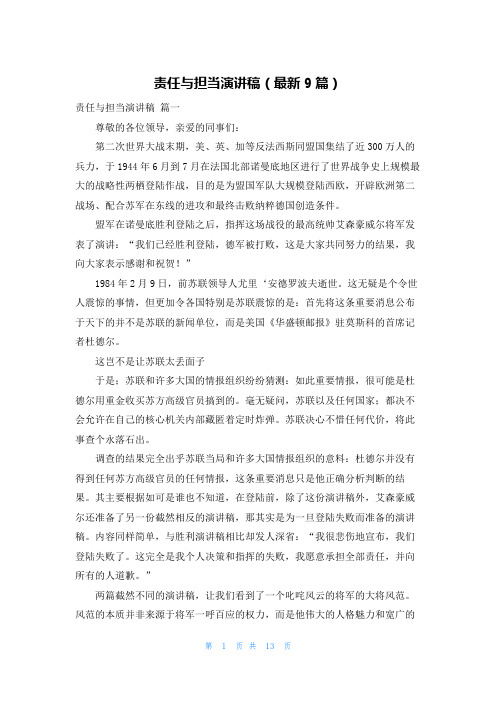
责任与担当演讲稿(最新9篇)责任与担当演讲稿篇一尊敬的各位领导,亲爱的同事们:第二次世界大战末期,美、英、加等反法西斯同盟国集结了近300万人的兵力,于1944年6月到7月在法国北部诺曼底地区进行了世界战争史上规模最大的战略性两栖登陆作战,目的是为盟国军队大规模登陆西欧,开辟欧洲第二战场、配合苏军在东线的进攻和最终击败纳粹德国创造条件。
盟军在诺曼底胜利登陆之后,指挥这场战役的最高统帅艾森豪威尔将军发表了演讲:“我们已经胜利登陆,德军被打败,这是大家共同努力的结果,我向大家表示感谢和祝贺!”1984年2月9日,前苏联领导人尤里‘安德罗波夫逝世。
这无疑是个令世人震惊的事情,但更加令各国特别是苏联震惊的是:首先将这条重要消息公布于天下的并不是苏联的新闻单位,而是美国《华盛顿邮报》驻莫斯科的首席记者杜德尔。
这岂不是让苏联太丢面子于是;苏联和许多大国的情报组织纷纷猜测:如此重要情报,很可能是杜德尔用重金收买苏方高级官员搞到的。
毫无疑问,苏联以及任何国家;都决不会允许在自己的核心机关内部藏匿着定时炸弹。
苏联决心不惜任何代价,将此事查个永落石出。
调查的结果完全出乎苏联当局和许多大国情报组织的意料:杜德尔并没有得到任何苏方高级官员的任何情报,这条重要消息只是他正确分析判断的结果。
其主要根据如可是谁也不知道,在登陆前,除了这份演讲稿外,艾森豪威尔还准备了另一份截然相反的演讲稿,那其实是为一旦登陆失败而准备的演讲稿。
内容同样简单,与胜利演讲稿相比却发人深省:“我很悲伤地宣布,我们登陆失败了。
这完全是我个人决策和指挥的失败,我愿意承担全部责任,并向所有的人道歉。
”两篇截然不同的演讲稿,让我们看到了一个叱咤风云的将军的大将风范。
风范的本质并非来源于将军一呼百应的权力,而是他伟大的人格魅力和宽广的胸襟。
胜利时,他将功劳归于大家,这是一种谦虚豁达的胸怀,失败时,他却将责任揽在自己身上,这种在失败面前勇于承担责任的胸怀更值得世人敬佩。
道威斯计划名词解释

道威斯计划名词解释道威斯计划(Dwight D. Eisenhower's Farewell Address)是美国第34任总统德怀特·D·艾森豪威尔在1961年1月17日发表的告别演说。
这个演讲被认为是对美国政治和国家安全的一种警示,同时也强调了美国在国际事务中应采取的态度和政策。
道威斯计划主要内容包括以下几个方面的解释:1.军事工业复杂结构(Military-Industrial Complex):艾森豪威尔在演讲中警告了军事工业复杂结构对美国国家安全和自由的潜在威胁。
他指出,军事工业复杂结构是指军队和军事产业之间的紧密联系,它使军工企业过度依赖军事开支和军火贸易,从而可能导致国家在和平时期也不断提高军费,并影响政治家和经济领导人的决策。
2.冷战(Cold War):艾森豪威尔在演讲中批评了冷战态势,并呼吁寻求外交、政治和经济解决冲突的方法。
他警告称,美国应该避免盲目地投入战争,并认识到军事力量的限制性。
他还指出,冷战竞赛可能导致国家资源的过度消耗,忽视社会和经济建设,甚至可能危及民主制度。
3.在国际事务中的充分参与(Active Participation in International Affairs):艾森豪威尔强调美国与其他国家合作的重要性,包括遵循联合国的原则和使用外交手段解决争端。
他表示,美国应该通过外交政策和经济援助来帮助其他国家,并与他们建立稳固的伙伴关系,以维护全球和平和稳定。
4.公民责任(Citizen Responsibility):艾森豪威尔强调每个公民对国家的责任,包括参与选举过程和支持自己的政府。
他鼓励美国人民保持警惕,不断关注政府的决策和行动,并积极参与社会事务,以确保国家的民主和自由得以持续。
道威斯计划的核心理念是克制和审慎,它提醒了美国军事力量和国际政治的互动中存在的风险和挑战,并呼吁美国在外交、政治和经济层面上更加开放和合作。
艾森豪威尔的告别演说

艾森豪威尔的告别演说今晚,我向你们请假和告别,和你们分享离任前的一些最后想法,我的同胞们。
和每位其他公民一样,我祝新总统和他的班子成功。
我祈祷来年和平繁荣。
我们现在已经走过本世纪中点十年了,在这个世纪我们目睹了四场伟大国家之间的大规模战争。
其中有三场我们国家也卷入了。
尽管经历了这些浩劫,美国仍是今天世界上最强大、最有影响力和最创造财富的国家。
我们为我们的杰出而自豪,然而我们也认识到美国的领导地位和威望不仅取决于我们无以伦比的物质加工能力、财富和军事实力,还取决于我们如何为人类的进步和世界的和平而使用这种力量。
向着这些崇高目标的进程一直受到席卷全球的冲突的威胁。
它主宰我们的全部注意,蚕食我们的存在。
我们面对以全球为范围的、以无神论为特征的、以凶残为目的的和以阴险为手段的敌对意识形态。
不幸的是它带来的威胁恐怕要无限延续。
为了成功地应对它,要求不能是太过冲冠一怒的牺牲,而是那些使我们坚定、稳步前行和为了自由的缘故无怨无悔地承担旷日持久的错综复杂的斗争的负担的东西。
只有这些才是我们要坚持的,不管在我们走向永久和平和人类进步的既定路线上遇到什么挑衅。
一个维护和平的性命攸关的要素就是我们的军事编制。
我们的武力必须强大,时刻能战,这样才能使潜在的侵略者不敢玩火自焚。
我们今天的军事组织已经今非昔比,是我的和平时期的各位前任,或者,说实话,包括二战和韩战的参与者都无法想象的。
直到我们的最后一次国际冲突,我国还没有军火工业。
美国的民品制造商们也可以,随时间推移,按需要生产军火。
但我们不能再拿国防冒险,临阵磨枪。
我们被迫创建了大批永久的军火工业。
此外,还有三百五十万优秀儿女直接投身于国防力量。
仅我们每年对军事安全的投入就超过了美国所有大公司的净收入。
现在庞大的军事力量于巨大的军火工业的结合在美国是史无前例的。
其总影响――经济的、政治的,甚至精神的――可以在每个城市,州政府和联邦政府感觉到。
我们认识到了发展的需要的急迫。
历届美国总统就职演讲大全

美国历届总统就职演讲(大全)内容简介美国总统的就职演讲是美国政治的一种形式,但它已经成为了美国的一种文化,美国总统的演讲辞更成为美国、乃至世界的文化遗产。
美国是实行总统制的典型国家。
美国总统身兼国家元首和行政首脑,在三权分立的政治结构中居重要地位。
美国实行总统内阁制,每四年选举一次总统,可连选连任一次。
每当新总统当选后,便要举行庄严而隆重的就职典礼。
这是美国政治生活中的一项重大的庆典。
总统就职典礼一般有4个程序:首先是就职宣誓;宣誓之后,总统发表就职演说;演说完毕,便开始盛大的庆祝游行;最后举行舞会。
美国总统借就职演说,表明自己政见和立场,起着鼓舞人民、教育人民的作用。
为了给人民留下良好的印象,总统对演说词斟酌推敲,以求打动人心。
好的演说词常常诞生在重大历史时刻,时势造英雄,这演说词也造就了传诵千古的名篇。
这里收集的《美国历届总统就职演讲(大全)》主要参考了李其荣《美国历届总统就职演讲辞》,另有一部分是从网络媒体下载的,并增加了最新的2013年奥巴马第二次就职演讲内容。
但第二十四届第二十一任切斯特·艾伦·阿瑟、第二十九届第二十六任西奥多•罗斯福、第三十四届第三十任卡尔文-柯立芝、第四十届第三十三任哈里·杜鲁门和第四十四届第三十六任林顿·约翰逊的就职演讲译文未找到。
截至目前,这个版本应该是收集的美国总统就职演讲大全了。
另附李其荣《美国历届总统就职演讲辞》“前言”。
目录第一届第一任乔治·华盛顿(1789~1793)首次就职演讲第二届第一任乔治·华盛顿(1793~1797)第二次就职演讲第三届第二任约翰·亚当斯(1797~1801)就职演讲第四届第三任托马斯·杰斐逊(1801~1805)首次就职演讲第五届第三任托马斯·杰斐逊(1805~1809)第二次就职演讲第六届第四任詹姆斯·麦迪逊(1809~1813)首次就职演讲第七届第四任詹姆斯·麦迪逊(1813-1817)第二次就职演讲第八届第五任詹姆斯·门罗(1817-1821)首次就职演讲第九届第五任詹姆斯·门罗(1821~1825)第二次就职演讲第十届第六任约翰·昆西·亚当斯(1825~1829)就职演讲第十一届第七任安德鲁·杰克逊(1829-1833)首次就职演讲第十二届第七任安德鲁·杰克逊(1833~1837)第二次就职演讲第十三届第八任马丁·范·布伦(1837~1841)就职演讲第十四届第九任威廉·亨利·哈里森(1841)就职演讲第十四届第十任约翰·泰勒(1841~1845)就职演讲第十五届第十一任詹姆斯·波尔克(1845~1849)就职演讲第十六届第十二任扎卡里·泰勒(1849~1850)就职演讲第十六届第十三任米勒德·菲尔莫尔(1850~1853)就职演讲第十七届第十四任富兰克林·皮尔斯(1853~1857)就职演讲第十八届第十五任詹姆斯·布坎南(1857~1861)就职演讲第十九届第十六任亚伯拉罕·林肯(1861~1865)首次就职演讲第二十届第十六任亚伯拉罕·林肯(1865)第二次就职演讲第二十届第十七任安德鲁·约翰逊(1865~1869)就职演讲第二十一届第十八任尤利西斯·格兰特(1869-1873)首次就职演讲第二十二届第十八任尤利西斯·格兰特(1873~1877)第二次就职演讲第二十三届第十九任拉瑟福德·海斯(1877~1881)就职演讲第二十四届第二十任詹姆斯·加菲尔德(1881)就职演讲第二十四届第二十一任切斯特·艾伦·阿瑟(1881~1885)就职演讲(暂无演讲词)第二十五届第二十二任格罗弗·克利夫兰(1885~1889)就职演讲第二十六届第二十三任本杰明·哈里森(1889-1893)就职演讲第二十七届第二十四任格罗弗·克利夫兰(1893~1897)就职演讲第二十八届第二十五任威廉·麦金莱(1897~1901)首次就职演讲第二十九届第二十五任威廉·麦金莱(1901)第二次就职演讲第二十九届第二十六任西奥多·罗斯福(1901~1905)首次就职演讲第三十届第二十六任西奥多·罗斯福(1905~1909)第二次就职演讲第三十一届第二十七任威廉·塔夫特(1909~1913)就职演讲第三十二届第二十八任伍德罗·威尔逊(1913-1917)首次就职演讲第三十三届第二十八任伍德罗·威尔逊(1917~1921)第二次就职演讲第三十四届第二十九任华伦·哈丁(1921~1923)就职演讲第三十四届第三十任卡尔文-柯立芝(1923~1925)就职演讲第三十五届第三十任卡尔文-柯立芝(1925-1929)就职演讲第三十六届第三十一任赫伯特·胡佛(1929~1933)就职演讲第三十七届第三十二任富兰克林·罗斯福(1933~1937)首次就职演讲第三十八届第三十二任富兰克林·罗斯福(1937~1941)第二次就职演讲第三十九届第三十二任富兰克林·罗斯福(1941~1945)第三次就职演讲第四十届第三十二任富兰克林·罗斯福(1945)第四次就职演讲第四十届第三十三任哈里·杜鲁门(1945~1949)首次就职演讲(暂无演讲词)第四十一届第三十三任哈里·杜鲁门(1949~1953)第二次就职演讲第四十二届第三十四任德怀特·艾森豪威尔威尔(1953-1957)首次就职演讲第四十三届第三十四任德怀特·艾森豪威尔威尔(1957~1961)第二次就职演讲第四十四届第三十五任约翰·肯尼迪(1961~1963)就职演讲第四十四届第三十六任林顿·约翰逊(1963~1965)首次就职演讲(无演讲词)第四十五届第三十六任林顿·约翰逊(1965~1969)第二次就职演讲第四十六届第三十七任理查德德·尼克松(1969~1973)首次就职演讲第四十七届第三十七任理查德德·尼克松(1973~1974)第二次就职演讲第四十七届第三十八任杰拉德·鲁道夫·福特(1974~1977)就职演讲第四十八届第三十九任杰米·卡特(1977~1981)就职演讲第四十九届第四十任罗纳德·里根(1981-1985)首次就职演讲第五十届第四十任罗纳德·里根(1985-1989)第二次就职演讲第五十一届第四十一任乔治·布什(1989~1993)就职演讲第五十二届第四十二任比尔·克林顿(1993~1997)首次就职演讲第五十三届第四十二任比尔·克林顿(1997-2001)第二次就职演讲第五十四届第四十三任乔治·沃克·布什(2001~2005)首次就职演讲第五十五届第四十三任乔治·沃克·布什(2005~2009)第二次就职演讲第五十六届第四十四任巴拉克·奥巴马(2008~2013)首次就职演讲第五十七届第四十四任巴拉克·奥巴马(2013~2017)第二次就职演讲(注:以下所谓届、任——届:根据美国宪法,总统选举每四年举行一次,总统任期四年,任满四年为一届。
艾森豪威尔在诺曼底登陆前的演讲
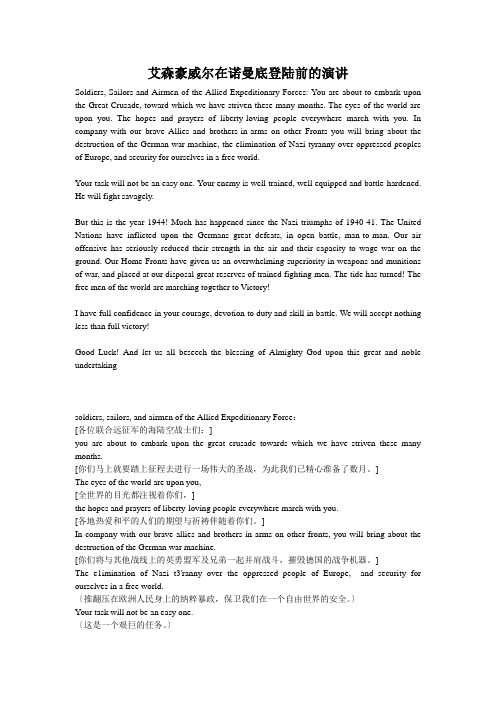
艾森豪威尔在诺曼底登陆前的演讲Soldiers, Sailors and Airmen of the Allied Expeditionary Forces: Y ou are about to embark upon the Great Crusade, toward which we have striven these many months. The eyes of the world are upon you. The hopes and prayers of liberty-loving people everywhere march with you. In company with our brave Allies and brothers-in-arms on other Fronts you will bring about the destruction of the German war machine, the elimination of Nazi tyranny over oppressed peoples of Europe, and security for ourselves in a free world.Y our task will not be an easy one. Y our enemy is well trained, well equipped and battle-hardened. He will fight savagely.But this is the year 1944! Much has happened since the Nazi triumphs of 1940-41. The United Nations have inflicted upon the Germans great defeats, in open battle, man-to-man. Our air offensive has seriously reduced their strength in the air and their capacity to wage war on the ground. Our Home Fronts have given us an overwhelming superiority in weapons and munitions of war, and placed at our disposal great reserves of trained fighting men. The tide has turned! The free men of the world are marching together to Victory!I have full confidence in your courage, devotion to duty and skill in battle. We will accept nothing less than full victory!Good Luck! And let us all beseech the blessing of Almighty God upon this great and noble undertakingsoldiers, sailors, and airmen of the Allied Expeditionary Force:[各位联合远征军的海陆空战士们:]you are about to embark upon the great crusade towards which we have striven these many months.[你们马上就要踏上征程去进行一场伟大的圣战,为此我们已精心准备了数月。
艾森豪威尔:原子能为和平服务
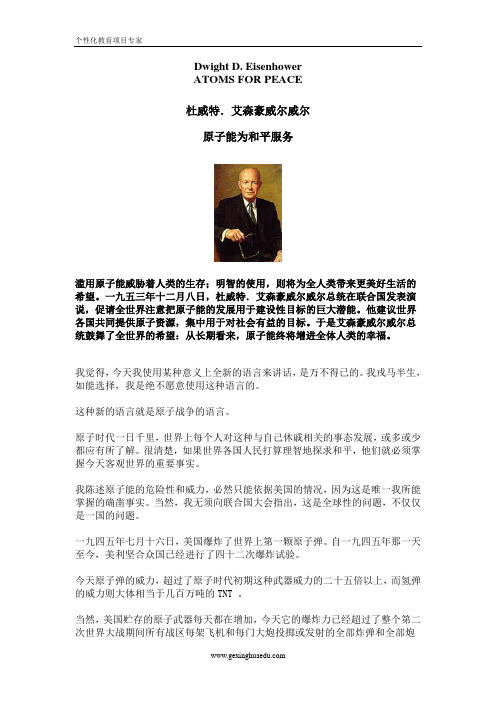
Dwight D. EisenhowerATOMS FOR PEACE杜威特.艾森豪威尔威尔原子能为和平服务滥用原子能威胁着人类的生存;明智的使用,则将为全人类带来更美好生活的希望。
一九五三年十二月八日,杜威特.艾森豪威尔威尔总统在联合国发表演说,促请全世界注意把原子能的发展用于建设性目标的巨大潜能。
他建议世界各国共同提供原子资源,集中用于对社会有益的目标。
于是艾森豪威尔威尔总统鼓舞了全世界的希望:从长期看来,原子能终将增进全体人类的幸福。
我觉得,今天我使用某种意义上全新的语言来讲话,是万不得已的。
我戎马半生,如能选择,我是绝不愿意使用这种语言的。
这种新的语言就是原子战争的语言。
原子时代一日千里,世界上每个人对这种与自己休戚相关的事态发展,或多或少都应有所了解。
很清楚,如果世界各国人民打算理智地探求和平,他们就必须掌握今天客观世界的重要事实。
我陈述原子能的危险性和威力,必然只能依据美国的情况,因为这是唯一我所能掌握的确凿事实。
当然,我无须向联合国大会指出,这是全球性的问题,不仅仅是一国的问题。
一九四五年七月十六日,美国爆炸了世界上第一颗原子弹。
自一九四五年那一天至今,美利坚合众国已经进行了四十二次爆炸试验。
今天原子弹的威力,超过了原子时代初期这种武器威力的二十五倍以上,而氢弹的威力则大体相当于几百万吨的TNT 。
当然,美国贮存的原子武器每天都在增加,今天它的爆炸力已经超过了整个第二次世界大战期间所有战区每架飞机和每门大炮投掷或发射的全部炸弹和全部炮弹总爆炸力许多倍。
现在一个空军作战单位不论是以水上或是陆地为基地,都能把爆炸力超过整个第二次世界大战期间落在英国领土上的全部炸弹的破坏性武器投送到任何一个可以达到的目标去。
原子武器在体积和品种上的变化也同样显着。
原子武器发展如此迅速,在我们各军种中实际上已经成为常规军备。
在美国,陆海空军和海军陆战队,都有能力把这种武器投入军事用途。
但是可怕的原子秘密和恐怖的原子威力,并非我们一国所专有。
艾森豪威尔在诺曼底的三篇演讲稿分析
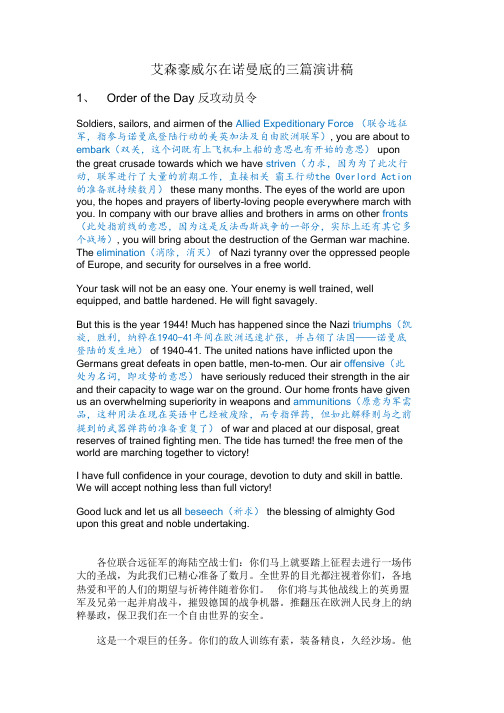
艾森豪威尔在诺曼底的三篇演讲稿1、Order of the Day 反攻动员令Soldiers, sailors, and airmen of the Allied Expeditionary Force (联合远征军,指参与诺曼底登陆行动的美英加法及自由欧洲联军), you are about to embark(双关,这个词既有上飞机和上船的意思也有开始的意思) upon the great crusade towards which we have striven(力求,因为为了此次行动,联军进行了大量的前期工作,直接相关霸王行动the Overlord Action 的准备就持续数月) these many months. The eyes of the world are upon you, the hopes and prayers of liberty-loving people everywhere march with you. In company with our brave allies and brothers in arms on other fronts (此处指前线的意思,因为这是反法西斯战争的一部分,实际上还有其它多个战场), you will bring about the destruction of the German war machine.The elimination(消除,消灭) of Nazi tyranny over the oppressed people of Europe, and security for ourselves in a free world.Your task will not be an easy one. Your enemy is well trained, well equipped, and battle hardened. He will fight savagely.But this is the year 1944! Much has happened since the Nazi triumphs(凯旋,胜利,纳粹在1940-41年间在欧洲迅速扩张,并占领了法国——诺曼底登陆的发生地) of 1940-41. The united nations have inflicted upon theGermans great defeats in open battle, men-to-men. Our air offensive(此处为名词,即攻势的意思) have seriously reduced their strength in the air and their capacity to wage war on the ground. Our home fronts have given us an overwhelming superiority in weapons and ammunitions(原意为军需品,这种用法在现在英语中已经被废除,而专指弹药,但如此解释则与之前提到的武器弹药的准备重复了) of war and placed at our disposal, great reserves of trained fighting men. The tide has turned! the free men of the world are marching together to victory!I have full confidence in your courage, devotion to duty and skill in battle. We will accept nothing less than full victory!Good luck and let us all beseech(祈求) the blessing of almighty God upon this great and noble undertaking.各位联合远征军的海陆空战士们:你们马上就要踏上征程去进行一场伟大的圣战,为此我们已精心准备了数月。
诺曼底登陆英语演讲稿
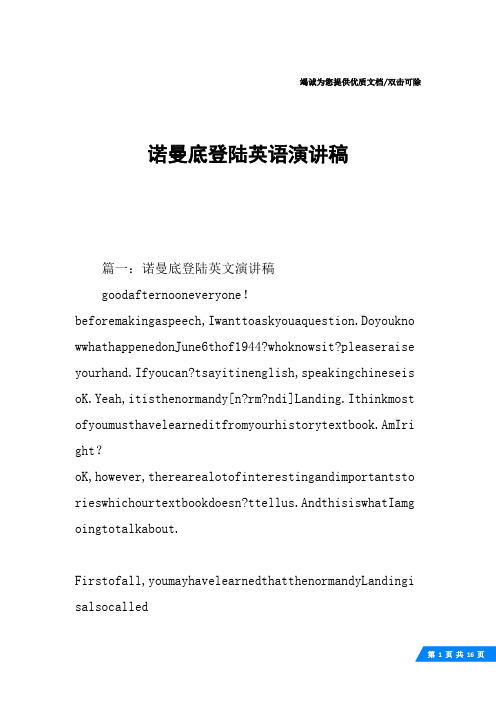
竭诚为您提供优质文档/双击可除诺曼底登陆英语演讲稿篇一:诺曼底登陆英文演讲稿goodafternooneveryone!beforemakingaspeech,Iwanttoaskyouaquestion.Doyoukno wwhathappenedonJune6thof1944?whoknowsit?pleaseraise yourhand.Ifyoucan?tsayitinenglish,speakingchineseis oK.Yeah,itisthenormandy[n?rm?ndi]Landing.Ithinkmost ofyoumusthavelearneditfromyourhistorytextbook.AmIri ght?oK,however,therearealotofinterestingandimportantsto rieswhichourtextbookdoesn?ttellus.AndthisiswhatIamg oingtotalkabout.Firstofall,youmayhavelearnedthatthenormandyLandingi salsocalled“theopeningofthesecondbattlefield”.sowhatdoes “thesecond”mean?whoknowsit?Raiseyourhand,please.Yeah,atthattim esoviet[so?viet]wasbattlingagainstgermanyandsovietw asthrownintodilemma[d?l?m?].Lotsoftroopswereruineda ndmoscowwasalmostseized[si:z].sostalin[stɑ:lin]demandedhisalliesbritainandAmericadosomething torelievehisburden[b?:dn].buttheprimeministerchurch ill[t??:t?il]hadhisownthoughts.hewantedtobenefitfromth ebattlebetweenthetwocountries.sohetookpainstofindth eexcusesforhisdelay[d?le?].hesaidbritainhadnoabilit ytoopenthesecondbattlefield.whydidchurchillsayso?be causeheattachedimportancetothemiddleeastandthemedit erranean[med?t??re?ni?n].britainhadplentyofcolonies [?k?l?ni]attheseplacesandtheywerelikelytobeattacked byAxispowers.obviously,inhisopinion,defendingbriti shinterestswasthemostimportant.Althoughtheopeningofthesecondbattlefieldwasdelayedy earafteryear,Alliedpowersfinallydecidedtolaunchtheplanin1944.butisitsoeasy?AlliedForcesthoughtthevital problemwasthelandingplace.Thereweretwoidealplaces.o newascalais[k?le?],theotherwasnormandy.nowletusanal yzethetwoplaces.calaiswasthenearestlandingpoint.but germanhadestablishedmanystrongholdsthere.normandywa sfarfrombritainbutthebeachwaswide,whichwouldhelpspr eadhugeamountsoftroops.Ifyouwerethecommanderin1944, whichplacewouldyouchoose?soundsalittledifficult.but whatisthevitalfactorofamilitaryaction?Itisactingabr uptlyandsurprisingly.Youmayhaveheardofthefamoussayi nginsunzi?sartofwar.Itis “marchwheretheenemycan?timagineandattackwhattheene mydoesn?tdefend”.soundsabitfamiliar?becausecalaisw asthenearestlandingpoint,germanguessedAlliedForcesw ouldlandatcalais.ofcoursetheyestablishedlotsofstron gholdssolandingwouldpayaheavyprice.ThenextproblemforAlliedForceswashowtohidetheirrealp urpose.germanwasnotafool.Ifgermanperceivedtherealpu rpose,theywouldtransfertheirtroopsfromcalaistonorma ndy.sointelligencewassignificant.Inordertodeceivetheenemy,AlliedForcesdidwhattheycou lddo.Theyestablishedastrongarmycalled “theFirstgroupArmy”anddeployedthearmynearcalaisandmostimportantly,theyass ignedgeorgebartontobethecommander.nowweknowitisfict itious[f?kts].butin1944germandidn?tknow.georgeba rtonwasfamousforhisoutstandingmilitarytalentandgerm anwasafraidofhim.Theythought:oh,bartonbecamethecomm anderoftheFirstgroupArmy,itmeanttheAlliedForceswoul dtakeabigaction.Theypaidattentiontothearmyandassign edspyplanestobritaintogetinformationaboutthearmy.Al liedForcesmadefulluseofthesegermanspyplanes.Theydep loyedlotsoftanks,planesandcannons[k?n?n]aroundtheba seoftheFirstgroupArmy.buttheywereallmadeofrubber.so interesting,right?Theywerenottherealweapons.however ,germanspyplanescouldn?tdistinguishthedifferences.T heyreturnedtogermanyandtoldhitlerthewronginformatio n.however,doingthesewasnotenoughtodeceivetheenemy.Ino rdertoprovethattheFirstgroupArmytrulyexisted,AlliedForcesdevelopedagreatnumberofdoubleagents.Doubleage ntmeansaspyservetwocountriesatthesametime.Thedouble agentswereusedbygermantogetintelligencefromAlliedFo rces.ofcoursetheygavethewronginformationtogerman.Th eysaidAlliedForceswouldlandatcalaisandtheFirstgroup Armywasverystrong.ThemostinconceivablethingwasthatAlliedForcesevenuse dactors.Theymanagedtofindanactorwhoresembled[r?zemb l]themarshalmontgomery[mɑntɡ?m?ri]verymuch.Therealmontgomeryhidandtheactorflew tonorthAfrica.germanspiesinnorthAfricafollowedthema rshalsecretlyandreportedallhisactivitiestogermanFor ces.ItgavegermanForcesawrongimpressionthatAlliedFor ceswouldtakeanactioninnorthAfricasotheydidn?tdareto transferalltheirtroopsfromnorthAfricatonorthFrance.Allinall,aseriesofintelligencedeceptionsandotherass istantstrategiesmadegermanbelievethatAlliedForceswo uldlandatcalais.whatisworse,whenAlliedForcesbeganto landatnormandy,germanForcesevenbelieveditwasanillusivemilitaryaction.Thechiefcommandereisenhower[a?z?n har]calledthefirstdayoflanding “thelongestday”.ThefamousgermanmarshalRommel[?rɑm?l]calledit“thedecisive24hours”.IntheendAlliedForceswonthede cisive24hours.whengermanreinforcements[ri:?n?f?:sm? nt]arrived,itwastoolate.That?sall.Thankyouverymuch!篇二:艾森豪威尔在诺曼底登陆前的演讲艾森豪威尔在诺曼底登陆前的演讲soldiers,sailorsandAirmenoftheAlliedexpeditionaryFo rces:Youareabouttoembarkuponthegreatcrusade,towardw hichwehavestriventhesemanymonths.Theeyesoftheworlda reuponyou.Thehopesandprayersofliberty-lovingpeoplee verywheremarchwithyou.IncompanywithourbraveAlliesan dbrothers-in-armsonotherFrontsyouwillbringaboutthed estructionofthegermanwarmachine,theeliminationofnaz ityrannyoveroppressedpeoplesofeurope,andsecurityfor ourselvesinafreeworld.Yourtaskwillnotbeaneasyone.Yourenemyiswelltrained,w ellequippedandbattle-hardened.hewillfightsavagely.butthisistheyear1944!muchhashappenedsincethenazitri umphsof1940-41.Theunitednationshaveinflicteduponthe germansgreatdefeats,inopenbattle,man-to-man.ourairo ffensivehasseriouslyreducedtheirstrengthintheairand theircapacitytowagewarontheground.ourhomeFrontshave givenusanoverwhelmingsuperiorityinweaponsandmunitio nsofwar,andplacedatourdisposalgreatreservesoftraine dfightingmen.Thetidehasturned!Thefreemenoftheworlda remarchingtogethertoVictory!Ihavefullconfidenceinyourcourage,devotiontodutyands killinbattle.wewillacceptnothinglessthanfullvictory!goodLuck!AndletusallbeseechtheblessingofAlmightygod uponthisgreatandnobleundertakingsoldiers,sailors,andairmenoftheAlliedexpeditionaryF orce:[各位联合远征军的海陆空战士们:]youareabouttoembarkuponthegreatcrusadetowardswhichwehavestriventhesemanymonths.??[你们马上就要踏上征程去进行一场伟大的圣战,为此我们已精心准备了数月。
【名人演讲】德怀特·戴维·艾森豪威尔:第二次总统就职演说
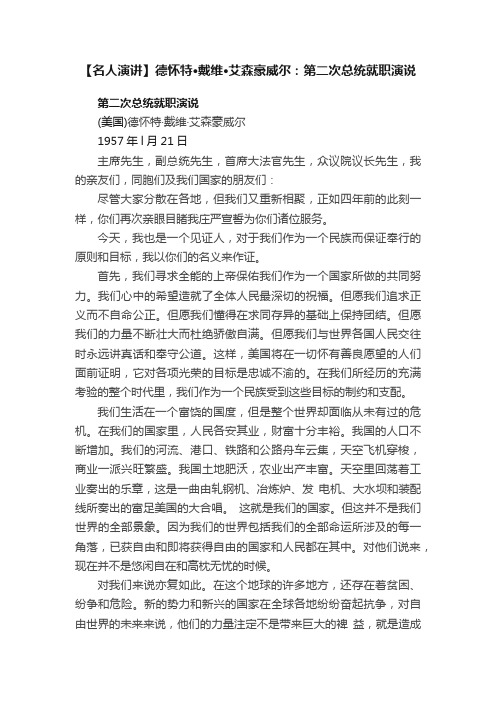
【名人演讲】德怀特·戴维·艾森豪威尔:第二次总统就职演说第二次总统就职演说(美国)德怀特·戴维·艾森豪威尔1957年l月21日主席先生,副总统先生,首席大法官先生,众议院议长先生,我的亲友们,同胞们及我们国家的朋友们:尽管大家分散在各地,但我们又重新相聚,正如四年前的此刻一样,你们再次亲眼目睹我庄严宣誓为你们诸位服务。
今天,我也是一个见证人,对于我们作为一个民族而保证奉行的原则和目标,我以你们的名义来作证。
首先,我们寻求全能的上帝保佑我们作为一个国家所做的共同努力。
我们心中的希望造就了全体人民最深切的祝福。
但愿我们追求正义而不自命公正。
但愿我们懂得在求同存异的基础上保持团结。
但愿我们的力量不断壮大而杜绝骄傲自满。
但愿我们与世界各国人民交往时永远讲真话和奉守公道。
这样,美国将在一切怀有善良愿望的人们面前证明,它对各项光荣的目标是忠诚不渝的。
在我们所经历的充满考验的整个时代里,我们作为一个民族受到这些目标的制约和支配。
我们生活在一个富饶的国度,但是整个世界却面临从未有过的危机。
在我们的国家里,人民各安其业,财富十分丰裕。
我国的人口不断增加。
我们的河流、港口、铁路和公路舟车云集,天空飞机穿梭,商业一派兴旺繁盛。
我国土地肥沃,农业出产丰富。
天空里回荡着工业奏出的乐章,这是一曲由轧钢机、冶炼炉、发电机、大水坝和装配线所奏出的富足美国的大合唱。
这就是我们的国家。
但这并不是我们世界的全部景象。
因为我们的世界包括我们的全部命运所涉及的每一角落,已获自由和即将获得自由的国家和人民都在其中。
对他们说来,现在并不是悠闲自在和高枕无忧的时候。
对我们来说亦复如此。
在这个地球的许多地方,还存在着贫困、纷争和危险。
新的势力和新兴的国家在全球各地纷纷奋起抗争,对自由世界的未来来说,他们的力量注定不是带来巨大的裨益,就是造成巨大的灾难。
从北非的沙漠到南太平洋的岛屿,全人类的三分之一已经参与一场争取一种新自由的历史性斗争,这是一场摆脱令人痛苦难熬的贫困的斗争。
艾森豪威尔的成功之道
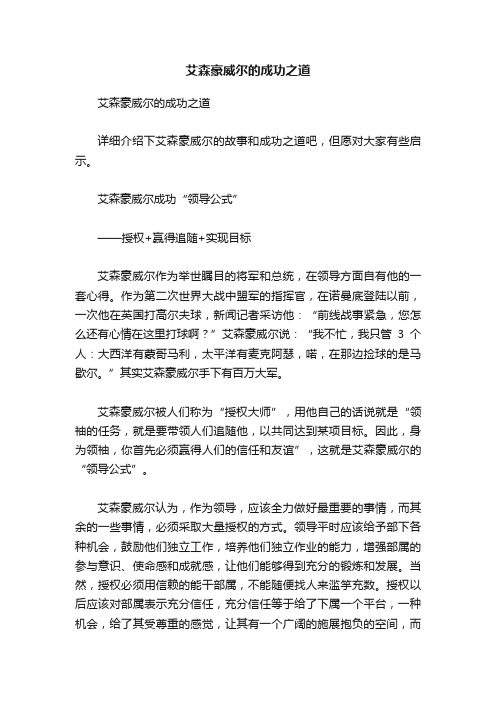
艾森豪威尔的成功之道艾森豪威尔的成功之道详细介绍下艾森豪威尔的故事和成功之道吧,但愿对大家有些启示。
艾森豪威尔成功“领导公式”——授权+赢得追随+实现目标艾森豪威尔作为举世瞩目的将军和总统,在领导方面自有他的一套心得。
作为第二次世界大战中盟军的指挥官,在诺曼底登陆以前,一次他在英国打高尔夫球,新闻记者采访他:“前线战事紧急,您怎么还有心情在这里打球啊?”艾森豪威尔说:“我不忙,我只管3个人:大西洋有蒙哥马利,太平洋有麦克阿瑟,喏,在那边捡球的是马歇尔。
”其实艾森豪威尔手下有百万大军。
艾森豪威尔被人们称为“授权大师”,用他自己的话说就是“领袖的任务,就是要带领人们追随他,以共同达到某项目标。
因此,身为领袖,你首先必须赢得人们的信任和友谊”,这就是艾森豪威尔的“领导公式”。
艾森豪威尔认为,作为领导,应该全力做好最重要的事情,而其余的一些事情,必须采取大量授权的方式。
领导平时应该给予部下各种机会,鼓励他们独立工作,培养他们独立作业的能力,增强部属的参与意识、使命感和成就感,让他们能够得到充分的锻炼和发展。
当然,授权必须用信赖的能干部属,不能随便找人来滥竽充数。
授权以后应该对部属表示充分信任,充分信任等于给了下属一个平台,一种机会,给了其受尊重的感觉,让其有一个广阔的施展抱负的空间,而自己则有充裕的时间去思考重大决策问题。
艾森豪威尔认为,自己胜任的决策可以不授权,不能胜任的决策就应该授权给他人,这样才能保证决策的可行性及领导的有效性。
比如他当选美国总统后,在国防和财政两个领域中就采取了不同的决策方式。
由于出身军人,艾森豪威尔对国防政策了如指掌,所以有关国防政策,往往是由艾森豪威尔自己作出决策。
而对于财经,艾森豪威尔所知有限,因此他谦逊地采取了主动较完整的授权,使当时的财政部长安德逊享有相当大的自主权。
除了上述两种方式,艾森豪威尔还会采取一种中间状态的授权方式,对于某些决策,艾森豪威尔允许部属自由做出,但事前必须让他知道决策的内容。
艾森豪威尔:Farewell Address 告别演说

艾森豪威尔:Farewell Address 告别演说dwight d. eisenhowerfarewell addressdelivered 17 january 1961演讲者简介:德怀特·大卫·艾森豪威尔(dwight david eisenhower,1890年10月14日-1969年3月28日),是美国陆军五星上将和第34任总统(1953年-1961年)。
第二次世界大战期间,他担任盟军在欧洲的最高指挥官;负责计划和执行监督1944年至1945年里,进攻维希法国和纳粹德国的行动。
1951年又出任北大西洋公约组织武装力量最高司令,昵称为艾克(ike)。
good evening, my fellow americans.first, i should like to e某press my gratitude to the radio and television networks for the opportunities they have given me over the years to bring reports and messages to our nation. my special thanks go to them for the opportunity of addressing you this evening.three days from now, after half century in the service of our country, i shall lay down the responsibilities of office as, in traditional and solemn ceremony, the authority of the presidency is vested in my successor. this evening, i come to you with a message of leave-taking and farewell, and to share a few final thoughts with you, my countrymen.like every other -- like every other citizen, i wish the new president, and all who will labor with him, godspeed. i pray that the coming years will be blessed with peace and prosperity for all.our people e某pect their president and the congress to find essential agreement on issues of great moment, the wise resolution of which will better shape the future of the nation. my own relations with the congress, which began on a remote and tenuous basis when, long ago, a member of the senate appointed me to west point, have sinceranged to the intimate during the war and immediate post-war period, and finally to the mutually interdependent during these past eight years. in this final relationship, the congress and the administration have, on most vital issues, cooperated well, to serve the nation good, rather than mere partisanship, and so have assured that the business of the nation should go forward. so, my official relationship with the congress ends in a feeling -- on my part -- of gratitude that we have been able to do so much together.we now stand ten years past the midpoint of a century that has witnessed four major wars among great nations. three of these involved our own country. despite these holocausts, america is today the strongest, the most influential, and most productive nation in the world. understandably proud of this pre-eminence, we yet realize that america's leadership and prestige depend, not merely upon our unmatched material progress, riches, and military strength, but on how we use our power in the interests of world peace and human betterment.throughout america's adventure in free government, our basic purposes have been to keep the peace, to foster progress in human achievement, and to enhance liberty, dignity, and integrity among peoples and among nations. to strive for less would be unworthy of a free and religious people. any failure traceable to arrogance, or our lack of comprehension, or readiness to sacrifice would inflict upon us grievous hurt, both at home and abroad.progress toward these noble goals is persistently threatened by the conflict now engulfing the world. it commands our whole attention, absorbs our very beings. we face a hostile ideology global in scope, atheistic in character, ruthless in purpose, and insiduous [insidious] in method. unhappily, the danger it poses promises to be of indefinite duration. to meet it successfully, there is called for, not so muchthe emotional and transitory sacrifices of crisis, but rather those which enable us to carry forward steadily, surely, and without complaint the burdens of a prolonged and comple某 struggle with liberty the stake. only thus shall we remain, despite every provocation, on our charted course toward permanent peace and human betterment.crises there will continue to be. in meeting them, whether foreign or domestic, great or small, there is a recurring temptation to feel that some spectacular and costly action could become the miraculous solution to all current difficulties. a huge increase in newer elements of our defenses; development of unrealistic programs to cure every ill in agriculture; a dramatic e某pansion in basic and applied research -- these and many other possibilities, each possibly promising in itself, may be suggested as the only way to the road we wish to travel.but each proposal must be weighed in the light of a broader consideration: the need to maintain balance in and among national programs, balance between the private and the public economy, balance between the cost and hoped for advantages, balance between the clearly necessary and the comfortably desirable, balance between our essential requirements as a nation and the duties imposed by the nation upon the individual, balance between actions of the moment and the national welfare of the future. good judgment seeks balance and progress. lack of it eventually finds imbalance and frustration. the record of many decades stands as proof that our people and their government have, in the main, understood these truths and have responded to them well, in the face of threat and stress.but threats, new in kind or degree, constantly arise. of these, i mention two only.a vital element in keeping the peace is our militaryestablishment. our arms must be mighty, ready for instant action, so that no potential aggressor may be tempted to risk his own destruction. our military organization today bears little relation to that known of any of my predecessors in peacetime, or, indeed, by the fighting men of world war ii or korea.until the latest of our world conflicts, the united states had no armaments industry. american makers of plowshares could, with time and as required, make swords as well. but we can no longer risk emergency improvisation of national defense. we have been compelled to create a permanent armaments industry of vast proportions. added to this, three and a half million men and women are directly engaged in the defense establishment. we annually spend on military security alone more than the net income of all united states cooperations -- corporations.now this conjunction of an immense military establishment and a large arms industry is new in the american e某perience. the total influence -- economic, political, even spiritual -- is felt in every city, every statehouse, every office of the federal government. we recognize the imperative need for this development. yet, we must not fail to comprehend its grave implications. our toil, resources, and livelihood are all involved. so is the very structure of our society.in the councils of government, we must guard against the acquisition of unwarranted influence, whether sought or unsought, by the military-industrial comple某. the potential for the disastrous rise of misplaced power e某ists and will persist. we must never let the weight of this combination endanger our liberties or democratic processes. we should take nothing for granted. only an alert and knowledgeable citizenry can compel the proper meshing of the huge industrial and military machinery of defense with our peaceful methodsand goals, so that security and liberty may prosper together.akin to, and largely responsible for the sweeping changes in our industrial-military posture, has been the technological revolution during recent decades. in this revolution, research has become central; it also becomes more formalized, comple某, and costly. a steadily increasing share is conducted for, by, or at the direction of, the federal government.today, the solitary inventor, tinkering in his shop, has been overshadowed by task forces of scientists in laboratories and testing fields. in the same fashion, the free university, historically the fountainhead of free ideas and scientific discovery, has e某perienced a revolution in the conduct of research. partly because of the huge costs involved, a government contract becomes virtually a substitute for intellectual curiosity. for every old blackboard there are now hundreds of new electronic computers. the prospect of domination of the nation's scholars by federal employment, project allocations, and the power of money is ever present -- and is gravely to be regarded.yet, in holding scientific research and discovery in respect, as we should, we must also be alert to the equal and opposite danger that public policy could itself become the captive of a scientific-technological elite.it is the task of statesmanship to mold, to balance, and to integrate these and other forces, new and old, within the principles of our democratic system -- ever aiming toward the supreme goals of our free society.another factor in maintaining balance involves the element of time. as we peer into society's future, we -- you and i, and our government -- must avoid the impulse to live only for today, plundering for our own ease and convenience the precious resources of tomorrow.we cannot mortgage the material assets of our grandchildren without risking the loss also of their political and spiritual heritage. we want democracy to survive for all generations to come, not to become the insolvent phantom of tomorrow.during the long lane of the history yet to be written, america knows that this world of ours, ever growing smaller, must avoid becoming a community of dreadful fear and hate, and be, instead, a proud confederation of mutual trust and respect. such a confederation must be one of equals. the weakest must come to the conference table with the same confidence as do we, protected as we are by our moral, economic, and military strength. that table, though scarred by many fast frustrations -- past frustrations, cannot be abandoned for the certain agony of disarmament -- of the battlefield.disarmament, with mutual honor and confidence, is a continuing imperative. together we must learn how to compose differences, not with arms, but with intellect and decent purpose. because this need is so sharp and apparent, i confess that i lay down my official responsibilities in this field with a definite sense of disappointment. as one who has witnessed the horror and the lingering sadness of war, as one who knows that another war could utterly destroy this civilization which has been so slowly and painfully built over thousands of years, i wish i could say tonight that a lasting peace is in sight.happily, i can say that war has been avoided. steady progress toward our ultimate goal has been made. but so much remains to be done. as a private citizen, i shall never cease to do what little i can to help the world advance along that road.so, in this, my last good night to you as your president, i thank you for the many opportunities you have given me for publicservice in war and in peace. i trust in that -- in that -- in that service you find some things worthy. as for the rest of it, i know you will find ways to improve performance in the future.you and i, my fellow citizens, need to be strong in our faith that all nations, under god, will reach the goal of peace with justice. may we be ever unswerving in devotion to principle, confident but humble with power, diligent in pursuit of the nations' great goals.to all the peoples of the world, i once more give e某pression to america's prayerful and continuing aspiration: we pray that peoples of all faiths, all races, all nations, may have their great human needs satisfied; that those now denied opportunity shall come to enjoy it to the full; that all who yearn for freedom may e某perience its few spiritual blessings. those who have freedom will understand, also, its heavy responsibility; that all who are insensitive to the needs of others will learn charity; and that the sources -- scourges of poverty, disease, and ignorance will be made [to] disappear from the earth; and that in the goodness of time, all peoples will come to live together in a peace guaranteed by the binding force of mutual respect and love.now, on friday noon, i am to become a private citizen. i am proud to do so. i look forward to it.thank you, and good night.。
英语演讲稿之森豪威尔告别演说
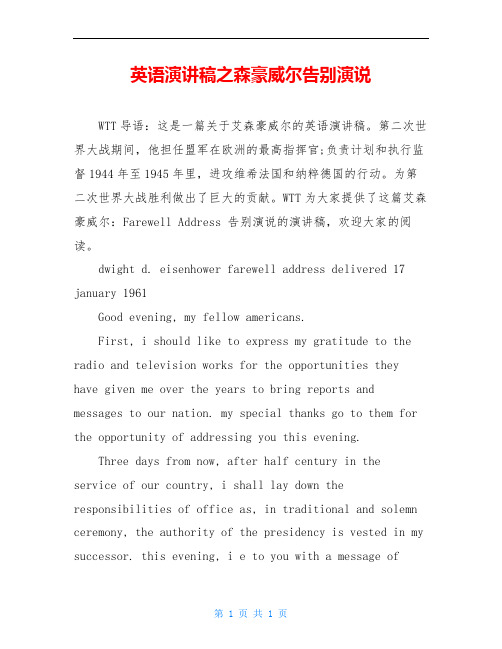
英语演讲稿之森豪威尔告别演说WTT导语:这是一篇关于艾森豪威尔的英语演讲稿。
第二次世界大战期间,他担任盟军在欧洲的最高指挥官;负责计划和执行监督1944年至1945年里,进攻维希法国和纳粹德国的行动。
为第二次世界大战胜利做出了巨大的贡献。
WTT为大家提供了这篇艾森豪威尔:Farewell Address 告别演说的演讲稿,欢迎大家的阅读。
dwight d. eisenhower farewell address delivered 17 january 1961Good evening, my fellow americans.First, i should like to express my gratitude to the radio and television works for the opportunities they have given me over the years to bring reports and messages to our nation. my special thanks go to them for the opportunity of addressing you this evening.Three days from now, after half century in the service of our country, i shall lay down the responsibilities of office as, in traditional and solemn ceremony, the authority of the presidency is vested in my successor. this evening, i e to you with a message ofleave-taking and farewell, and to share a few final thoughts with you, my countrymen.Like every other -- like every other citizen, i wish the new president, and all who will labor with him, godspeed. i pray that the ing years will be blessed with peace and prosperity for all.Our people expect their president and the congress to find essential agreement on issues of great moment, the wise resolution of which will better shape the future of the nation. my own relations with the congress, which began on a remote and tenuous basis when, long ago, a member of the senate appointed me to west point, havesince ranged to the intimate during the war and immediate post-war period, and finally to the mutually interdependent during these past eight years. in thisfinal relationship, the congress and the administration have, on most vital issues, cooperated well, to serve the nation good, rather than mere partisanship, and so have assured that the business of the nation should go forward. so, my official relationship with the congress ends in a feeling -- on my part -- of gratitude that we have been able to do so much together.We now stand ten years past the midpoint of a century that has witnessed four major wars among great nations. three of these involved our own country. despite these holocausts, america is today the strongest, the most influential, and most productive nation in the world. understandably proud of this pre-eminence, we yet realize that america's leadership and prestige depend, not merely upon our unmatched material progress, riches, and military strength, but on how we use our power in the interests of world peace and human betterment.Throughout america's adventure in free government, our basic purposes have been to keep the peace, to foster progress in human achievement, and to enhance liberty, dignity, and integrity among peoples and among nations.to strive for less would be unworthy of a free andreligious people. any failure traceable to arrogance, or our lack of prehension, or readiness to sacrifice would inflict upon us grievous hurt, both at home and abroad.Progress toward these noble goals is persistently threatened by the conflict now engulfing the world. it mands our whole attention, absorbs our very beings. weface a hostile ideology global in scope, atheistic incharacter, ruthless in purpose, and insiduous [insidious] in method. unhappily, the danger it poses promises to be of indefinite duration. to meet it successfully, there is called for, not so much the emotional and transitory sacrifices of crisis, but rather those which enable us to carry forward steadily, surely, and without plaint the burdens of a prolonged and plex struggle with liberty the stake. only thus shall we remain, despite every provocation, on our charted course toward permanent peace and human betterment.Crises there will continue to be. in meeting them, whether foreign or domestic, great or small, there is a recurring temptation to feel that some spectacular and costly action could bee the miraculous solution to all current difficulties. a huge increase in newer elements of our defenses; development of unrealistic programs to cure every ill in agriculture; a dramatic expansion in basic and applied research -- these and many other possibilities, each possibly promising in itself, may be suggested as the only way to the road we wish to travel.But each proposal must be weighed in the light of a broader consideration: the need to maintain balance inand among national programs, balance between the private and the public economy, balance between the cost and hoped for advantages, balance between the clearly necessary and the fortably desirable, balance between our essential requirements as a nation and the duties imposed by the nation upon the individual, balance between actions of the moment and the national welfare of the future. good judgment seeks balance and progress. lack of it eventually finds imbalance and frustration. the record of many decades stands as proof that our people and their government have, in the main, understood these truths and have responded to them well, in the face of threat and stress.But threats, new in kind or degree, constantly arise. of these, i mention two only.A vital element in keeping the peace is our military establishment. our arms must be mighty, ready for instant action, so that no potential aggressor may be tempted to risk his own destruction. our military organization today bears little relation to that known of any of my predecessors in peacetime, or, indeed, by the fighting men of world war ii or korea.Until the latest of our world conflicts, the united states had no armaments industry. american makers of plowshares could, with time and as required, make swordsas well. but we can no longer risk emergencyimprovisation of national defense. we have been pelled to create a permanent armaments industry of vast proportions. added to this, three and a half million men and women are directly engaged in the defense establishment. weannually spend on military security alone more than the ine of all united states cooperations -- corporations.Now this conjunction of an immense military establishment and a large arms industry is new in the american experience. the total influence -- economic, political, even spiritual -- is felt in every city, every statehouse, every office of the federal government. we recognize the imperative need for this development. yet, we must not fail to prehend its grave implications. our toil, resources, and livelihood are all involved. so isthe very structure of our society.In the councils of government, we must guard against the acquisition of unwarranted influence, whether soughtor unsought, by the military-industrial plex. thepotential for the disastrous rise of misplaced power exists and will persist. we must never let the weight of this bination endanger our liberties or democratic processes. we should take nothing for granted. only an alert and knowledgeable citizenry can pel the proper meshing of the huge industrial and military machinery of defense with our peaceful methods and goals, so that security and liberty may prosper together.Akin to, and largely responsible for the sweeping changes in our industrial-military posture, has been the technological revolution during recent decades. in this revolution, research has bee central; it also bees more formalized, plex, and costly. a steadily increasing share is conducted for, by, or at the direction of, the federal government.Today, the solitary inventor, tinkering in his shop, has been overshadowed by task forces of scientists in laboratories and testing fields. in the same fashion, the free university, historically the fountainhead of free ideas and scientific discovery, has experienced a revolution in the conduct of research. partly because of the huge costs involved, a government contract beesvirtually a substitute for intellectual curiosity. for every old blackboard there are now hundreds of new electronic puters. the prospect of domination of the nation's scholars by federal employment, project allocations, and the power of money is ever present -- and is gravely to be regarded.Yet, in holding scientific research and discovery in respect, as we should, we must also be alert to the equal and opposite danger that public policy could itself bee the captive of a scientific-technological elite.It is the task of statesmanship to mold, to balance, and to integrate these and other forces, new and old, within the principles of our democratic system -- ever aiming toward the supreme goals of our free society.Another factor in maintaining balance involves the element of time. as we peer into society's future, we -- you and i, and our government -- must avoid the impulse to live only for today, plundering for our own ease and convenience the precious resources of tomorrow. we cannot mortgage the material assets of our grandchildren without risking the loss also of their political and spiritual heritage. we want democracy tosurvive for all generations to e, not to bee theinsolvent phantom of tomorrow.During the long lane of the history yet to be written, america knows that this world of ours, ever growing smaller, must avoid being a munity of dreadful fear and hate, and be, instead, a proud confederation of mutualtrust and respect. such a confederation must be one of equals. the weakest must e to the conference table withthe same confidence as do we, protected as we are by our moral, economic, and military strength. that table,though scarred by many fast frustrations -- past frustrations, cannot be abandoned for the certain agonyof disarmament -- of the battlefield.Disarmament, with mutual honor and confidence, is a continuing imperative. together we must learn how to pose differences, not with arms, but with intellect and decent purpose. because this need is so sharp and apparent, i confess that i lay down my official responsibilities in this field with a definite sense of disappointment. asone who has witnessed the horror and the lingeringsadness of war, as one who knows that another war could utterly destroy this civilization which has been soslowly and painfully built over thousands of years, iwish i could say tonight that a lasting peace is in sight.Happily, i can say that war has been avoided. steady progress toward our ultimate goal has been made. but so much remains to be done. as a private citizen, i shall never cease to do what little i can to help the world advance along that road.So, in this, my last good night to you as your president, i thank you for the many opportunities youhave given me for public service in war and in peace. i trust in that -- in that -- in that service you find some things worthy. as for the rest of it, i know you willfind ways to improve performance in the future.You and i, my fellow citizens, need to be strong inour faith that all nations, under god, will reach thegoal of peace with justice. may we be ever unswerving in devotion to principle, confident but humble with power, diligent in pursuit of the nations' great goals.To all the peoples of the world, i once more give expression to america's prayerful and continuing aspiration: we pray that peoples of all faiths, all races, all nations, may have their great human needs satisfied;that those now denied opportunity shall e to enjoy it to the full; that all who yearn for freedom may experienceits few spiritual blessings. those who have freedom will understand, also, its heavy responsibility; that all who are insensitive to the needs of others will learn charity; and that the sources -- scourges of poverty, disease, and ignorance will be made [to] disappear from the earth; and that in the goodness of time, all peoples will e to live together in a peace guaranteed by the binding force of mutual respect and love.Now, on friday noon, i am to bee a private citizen. i am proud to do so. i look forward to it.Thank you, and good night.第 1 页共 1 页。
军事工业复合体
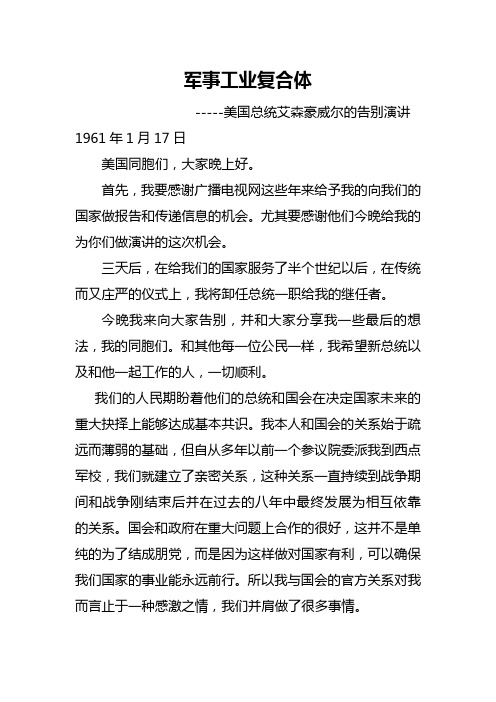
军事工业复合体-----美国总统艾森豪威尔的告别演讲1961年1月17日美国同胞们,大家晚上好。
首先,我要感谢广播电视网这些年来给予我的向我们的国家做报告和传递信息的机会。
尤其要感谢他们今晚给我的为你们做演讲的这次机会。
三天后,在给我们的国家服务了半个世纪以后,在传统而又庄严的仪式上,我将卸任总统一职给我的继任者。
今晚我来向大家告别,并和大家分享我一些最后的想法,我的同胞们。
和其他每一位公民一样,我希望新总统以及和他一起工作的人,一切顺利。
我们的人民期盼着他们的总统和国会在决定国家未来的重大抉择上能够达成基本共识。
我本人和国会的关系始于疏远而薄弱的基础,但自从多年以前一个参议院委派我到西点军校,我们就建立了亲密关系,这种关系一直持续到战争期间和战争刚结束后并在过去的八年中最终发展为相互依靠的关系。
国会和政府在重大问题上合作的很好,这并不是单纯的为了结成朋党,而是因为这样做对国家有利,可以确保我们国家的事业能永远前行。
所以我与国会的官方关系对我而言止于一种感激之情,我们并肩做了很多事情。
我们所处的这个世纪已经过了60年,这个世纪发生了世界大国之间的四次主要战争。
其中三次我们的国家都参战了。
尽管经历了这些灾难,今天的美国仍是世界上最强大、最具影响力、生产能力最发达的国家。
我们当然以自己的杰出而自豪,但我们意识到美国的领导力和威望不是仅靠难以匹敌的物质发展、富足和军事力量,而是在于我们为世界的和平和人类的进步而使用权力。
美国尝试自由政府,自始至终,我们的根本目的就是要维护和平、促进人类进步、保护自由和尊严、加强人与人之间、国家与国家之间的团结。
这些才是一个自由而虔诚的民族的追求。
不管是在我们自己的国家或是国外,任何自大、缺少理解或是不愿牺牲都会使我们悲伤,使我们煎熬。
向着这些崇高目标前进的步伐正在受到世界范围冲突的阻挠,需要我们高度重视,全身心投入。
我们面对一个全球范围的敌对的意识形态,以无信仰为标志,目标极其残忍,手段却又极其隐蔽。
- 1、下载文档前请自行甄别文档内容的完整性,平台不提供额外的编辑、内容补充、找答案等附加服务。
- 2、"仅部分预览"的文档,不可在线预览部分如存在完整性等问题,可反馈申请退款(可完整预览的文档不适用该条件!)。
- 3、如文档侵犯您的权益,请联系客服反馈,我们会尽快为您处理(人工客服工作时间:9:00-18:30)。
展望有待书写的未来历史长卷,美国深知我们这个越来越小的世界决不应变成一个充满恐惧和仇恨的可怕的群体,相反,它应成爲一个相互信任、相互尊重的光辉的联盟。
这样一个联盟必定是平等国家间的联盟。最弱小的国家一定以与我们相同的自信心来到会议桌旁,和我们一样受到我们的道德、经济和军事力量的保护。那会议桌虽然留下历史坎坷的累累伤痕,但我们不能将它抛弃以换来战场的惨剧。
在这场技术革命中,研究工作已趋于集中;它也变得更正规,更复杂,更昂贵。爲联邦政府而实施,由联邦政府实施,或在联邦政府指导下实施的研究工作份额正逐步增加。
由联邦政府雇用而形成支配全国学者的局面,以及统一分配项目,统一控制财力,这种前景一直存在,而且应当引起严重关注。
我们应该尊重科学研究和探索,但与此同时我们必须对这一同样严重的负面危险保持警惕,即政府政策本身可能沦爲一个科学──技术精英阶层的俘虏。
Like every other -- Like every other citizen, I wish the new President, and all who will labor with him, Godspeed. I pray that the coming years will be blessed with peace and prosperity for all.
走向这些崇高目标的进程一直受到现在正席卷全球的冲突的威胁。这种冲突迫使我们全神贯注,全力以赴。我们面对一种敌对的意识形态──具有世界性规模和无神论性质,目标残忍,手段阴险。不幸的是,它所造成的危险将长期存在。欲成功地对付它,所要求的与其说是危急关头感情上短暂的痛苦,毋宁说是作出牺牲以使我们能坚定踏实、任劳任怨地承担一场长期复杂斗争的重任──与自由共存亡。只有这样我们才能战胜一次又一次的挑衅,始终朝着世界持久和平和人类美好未来的方向前进。……
著作:《远征欧洲》、《受命变革》、《缔造和平》、《悠闲的话》
名言:“我不能容忍那些把一切与他们见解不同得人都称作共产党的极右分子,我也不能容忍那些高呼我们其余的人都是残酷的贪财牟利之徒的极右分子。”
Three days from now, after half century in the service of our country, I shall lay down the responsibilities of office as, in traditional and solemn ceremony, the authority of the Presidency is vested in my successor. This evening, I come to you with a message of leave-taking and farewell, and to share a few final thoughts with you, my countrymen.
We now stand ten years past the midpoint of a century that has witnessed four major wars among great nations. Three of these involved our own country. Despite these holocausts, America is today the strongest, the most influential, and most productive nation in the world. Understandably proud of this pre-eminence, we yet realize that America's leadership and prestige depend, not merely upon our unmatched material progress, riches, and military strength, but on how we use our power in the interests of world peace and human betterment.
以相互尊敬和信任实行裁军仍是一项迫切任务。我们必须一起学习怎样不用武力,而是以理智和公正的意图去解决纷争。因爲裁军的紧迫性如此明显突出,我承认我是怀着某种失望的心情卸下我的总统职责的。作爲一个目睹过战争的恐怖及其难以愈合的创伤的人──深知另一场战争会彻底毁掉历经数千年缓慢而又艰苦地建成的人类文明──我但愿自己今晚能说:持久和平已遥遥在望。
我们的军队是维护和平必不可少的要素。我们的武装力量必须强大,随时准备投入行动,以使任何潜在的侵略者都不敢贸然以卵击石。
我们今天的军事组织与我的任何一位和平时期前任所了解的,与第二次世界大战或朝鲜战争中的军人所了解的军事组织大相径庭。
直至最近的一次世界性冲突之前、美国仍没有军事工业。美国的犁铧制造商们在必要时也能制造剑。但是现在我们不能再以临阵磨枪的方式承担国防上的风险;我们已被迫创建一个规模宏大的永久性军事工业。此外,350万男人和妇女直接服务于国防机构。我们每年在军事安全上的开支超过了美国所有的公司的纯收入。
治国之才的任务,是在我们民主制度的原则范畴内,塑造、平衡和融合这些和其它新旧力量──始终以实现我们自由社会的最高目标爲目的。
另一个保持平衡的因素涉及时间这一要素。当我们展望社会的未来时,我们──你、我和我国政府──必须避免一种只顾今日生活的冲动,不应爲了我们自己的舒适和便利巧取豪夺明天的宝贵资源。我们不可能以孙儿辈的物质财富作抵押,而又不冒使他们丧失政治和精神遗産的风险。我们要让民主代代相传,它不该成爲明天无力还债的鬼魂。
我们决不能让这一联合体的势力危害我们的自由或民主进程。我们不应心存侥幸。只有警觉而明智的美国公民才能强迫庞大的工业和军事的国防机构与我们和平的手段和目标恰当配合,以使安全和自由并驾齐驱,同获成功。
近几十年的技术革命与我们的工业─军事状况的巨大变化有相似之处,而且对这种巨大变化起了很大作用。
Throughout America's adventure in free government, our basic purposes have been to keep the peace, to foster progress in human achievement, and to enhance liberty, dignity, and integrity among peoples and among nations. To strive for less would be unworthy of a free and religious people. Any failure traceable to arrogance, or our lack of comprehension, or readiness to sacrifice would inflict upon us grievous hurt, both at home and abroad.
幸好我可以说,已经避免发生战争了。朝我们的终极目标已迈开坚实的步伐。但是任重而道远。作爲一个普通公民,我将始终不渝地爲推动世界沿着这条道路前进贡献一份绵薄。……
戴维·艾森豪威尔国会告别演讲
艾森豪威尔是格兰特总统之后第二位职业军人出身的总统。1953-1961年,艾森豪威尔连任两届美国总统。在美军历史上,艾森豪威尔是一个充满戏剧性的传奇人物。他曾获得很多个第一。在美军历史上,共授予10名五星上将,艾森豪威尔是晋升得“第一快”;他出身“第一穷”;他是美军统率最大战役行动的第一人;他是第一个担任北大西洋公约组织盟军最高统帅;他是美军退役高级将领担任哥伦比亚大学校长的第一人;他的前途是“第一大”--惟一的一个当上总统的五星上将。
再过三天,在我为我国服务半个世纪之后,随着总统的权威按传统的隆重仪式归属我的继任者,本人将卸下公职。
我们现在的日期距本世纪中点已过十年,这个世纪经历了大国之间四次大的战争,我们自己的国家卷入其中三次。
尽管发生了这些大规模的战祸,当今美国乃是世界上最强大、最有影响、生産力最高的国家。我们自然爲此卓越成就感到自豪,但我们也意识到,美国的领导地位和威信不仅取决于我们举世无双的物质进步、财富和军事力量,而且取决于我们如何爲世界和平与人类福利使用我们的力量。 纵观美国在自由政府体制上的探索历程,我们的基本目的始终是维护和平,促进人类进步,在人民中和国家之间增进自由权,提高尊严,宏扬正直的品质。追求较低的目标会辱没一个自由、有虔诚宗教信仰的民族。任何由于骄傲自大或理解力不强或缺乏奉献精神的失败都将在国内外给我们带来严重损害。
Progress toward these noble goals is persistently threatened by the conflict now engulfing the world. It our very beings. We face a hostile ideology global in scope, atheistic in character, ruthless in purpose, and insiduous [insidious] in method. Unhappily, the danger it poses promises to be of indefinite duration. To meet it successfully, there is called for, not so much the emotional and transitory sacrifices of crisis, but rather those which enable us to carry forward steadily, surely, and without complaint the burdens of a prolonged and complex struggle with liberty the stake. Only thus shall we remain, despite every provocation, on our charted course toward permanent peace and human betterment.
